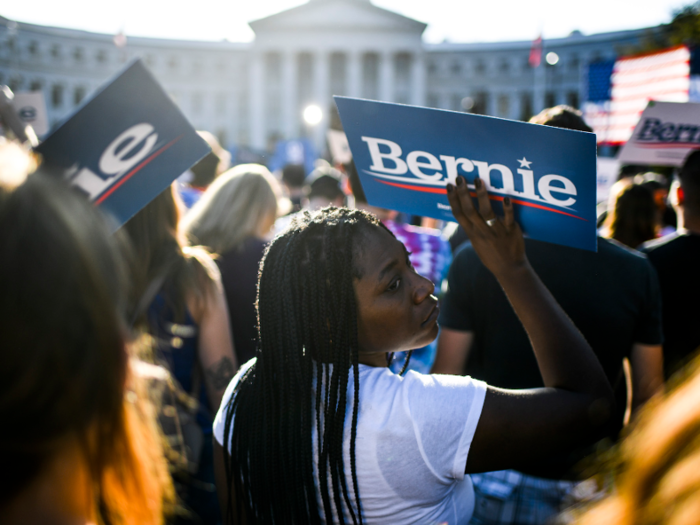- Home
- slideshows
- miscellaneous
- 70% of millennials say they'd vote for a socialist. 5 facts about their debt-saddled economic situation tell you why.
70% of millennials say they'd vote for a socialist. 5 facts about their debt-saddled economic situation tell you why.
Income for young adults has grown by just $29 since 1974.

College tuition has more than doubled since the 1980s.

College tuition has increased at an even faster rate than wages. From the late 1980s to 2018, the cost of an undergraduate degree increased by 213% at public schools and 129% at private schools, adjusting for inflation, Student Loan Hero reported, citing stats from The College Board.
Consequently, the national total student-loan debt now exceeds $1.5 trillion. The average student-loan debt per graduating student in 2018 who took out loans is $29,800.
Since wage increase has been minimal, post-grad salaries aren't exactly offsetting the education costs spent in hopes of landing a job. Nearly half of millennials said the biggest mistake they made with their student loans was overestimating the salary of their first job out of college and assuming they'd be able to afford their monthly payments, according to a survey by personal finance company SoFi.
Student-loan debt is so stressful that it's the reason why 13% of Americans in a survey conducted last year said they decided not to have kids, Business Insider's Shana Lebowitz reported, citing the survey from The New York Times.
Student-loan borrowers are also delaying or refraining from buying a house, because they can't afford it.
Homes are nearly 40% more expensive than they were 40-plus years ago.

The median price of home sales has increased by 39% since the 1970s, according to the SuperMoney report, which analyzed data from the US Federal Housing Agency.
It's even harder to save for these higher housing costs when dealing with stagnant wages and other forms of debt. It would take the median earner in the 25 largest US cities between four and 10 years to save enough cash for a 20% down payment on a median-priced home, a recent SmartAsset study found.
Even millennials who have been able to buy homes are swimming in their mortgage. A new survey from Insider and Morning Consult found that a mortgage is typically millennials' biggest debt. Of millennial respondents with a mortgage (27.7%), 23% owe $50,000 to $100,000, and half owe more than $100,000.
Millennials are also facing rising healthcare costs — and it's preventing them from seeking help for their mental health.

National health care costs per person have increased by $9,000 since 1970, according to the SuperMoney report.
In 1960, the average annual health-insurance cost per person was $146 — in 2016, it hit $10,345. CNBC reported that's a full nine times higher when adjusted for inflation.
Being able to afford healthcare is more important than ever for millennials who need to find help for their mental health. Depression and "deaths of despair" are on the rise among the generation, many of whom suffer from loneliness, money stress, and burnout in the workplace.
While millennials are more likely than previous generations to attend therapy, one in five millennials diagnosed with major depression don't seek treatment, according to a Blue Cross report. That might be because of the rising healthcare costs.
And nearly a quarter of millennials have had to take out personal debt or a line of credit or medical debt, according to the Insider and Morning Consult survey.
More than half of millennials have credit-card debt.

When most of a minimal income ends up on rising housing and education costs, it's easy to end up putting daily living costs on a credit card. More than half (51.5%) of millennials in the Insider and Morning Consult survey said they had credit-card debt.
Of those who were in credit-card debt, slightly more than half (54%) said they owed less than $5,000, and 24% said they owed $5,000 to $10,000. The remaining one-fourth said they owed significantly more — 9% owe $10,000 to $20,000, 4.5% owe $20,000 to $30,000, and 4.5% owe more than $30,000.
All of these debt loads help explain why 60% of adults define financial success as being debt-free, according to a Merrill Lynch Wealth Management report. According to the report, which cited the Survey of Consumer Finances, 81% of early-adult households carry a collective debt of nearly $2 trillion. The debt includes car loans and mortgages but is mainly made up of student-loan debt and credit-card debt.
All of these factors are pushing people toward left-leaning candidates.

Sanders, a self-described democratic socialist is centering his campaign on reducing economic inequality, expanding the safety net through Medicare-for-all and the Green New Deal, and taxing the rich.
Meanwhile, Warren has rolled out a series of ambitious proposals to make public college free for all who attend, cancel student debt, build a universal childcare system, and implement a wealth tax on the richest Americans.
And Sen. Kamala Harris is running on a broad progressive platform that includes Medicare-for-all, marijuana legalization, and the Green New Deal.
Even less liberal democrats who lean more toward the center are proposing policies to tackle these debt issues. Sen. Michael Bennett is opposed to Sen. Bernie Sanders' Medicare-for-all legislation but has proposed offering a public option for health insurance and allowing the government to negotiate Medicare drug prices.
Meanwhile, a senior student-loan official in the Trump admistration, A. Wayne Johnson, announced his resignation last week with a call for addressing a "fundamentally broken" student loan system. He plans on running to fill a vacated Senate seat in Georgia.
Popular Right Now
Popular Keywords
Advertisement